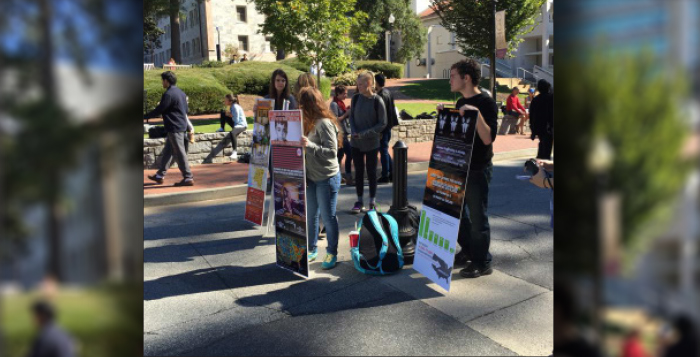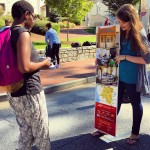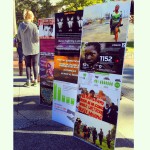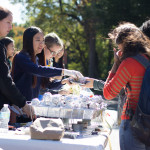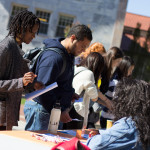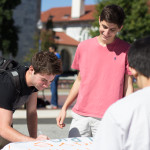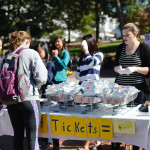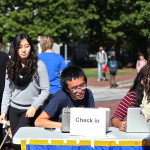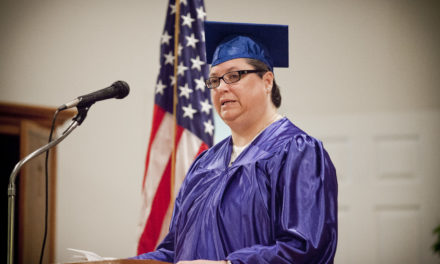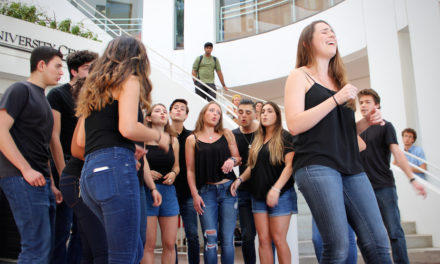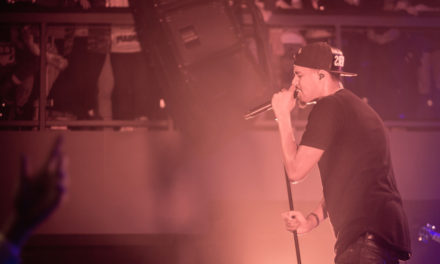
Emory University students supported Thoughtful Thursday by holding up signs with information relevant to sexual trafficking and rape. | Photo courtesty of Matthew Caron
Thoughtful Thursday: Human Rights Awareness took place on Emory University’s Cox Bridge on Thursday, Oct. 23 in order to disperse information regarding human rights violations. This event, the first of many to take place monthly, highlighted the importance of being cognizant about instances of sexual trafficking and rape that happen in American society as well as outside its confines. Stacey Leiman, College senior and founder of the Thoughtful Thursday events, sat down with the Wheel to share the motivations and the goals behind her project.
Loli Lucaciu: How did the idea of Thoughtful Thursdays come about?
Stacey Leiman: The idea for Thoughtful Thursday specifically came from needing a way to expose human rights violations to Emory students. It’s so easy to get caught up in our own work and meetings that we forget that there are millions of people dealing with these kinds of violations every day. Thoughtful Thursday gives Emory students a way to educate themselves about these issues while not having to do any extra work except look at a poster and have someone tell you about the issue as you walk to class.
LL: What were the main motivating forces behind the creation of your project?
SL: I created the idea because I have always been passionate about spreading awareness of human rights violations. Education is incredibly important to me, and there are so many ways to educate people outside of the classroom. Thoughtful Thursday is so important because it helps educate the student body about real issues that are happening every day.
LL: When are these special Thursdays happening?
SL: Thoughtful Thursday will happen every third Thursday of the month. So many T’s!
LL: What are the main goals of these events?
SL: The main purpose of the event is to spread awareness of human rights violations around the world. This goal will hopefully be achieved by having more Thoughtful Thursday events and more students knowing about it.
LL: Why did you choose the topic of sexual trafficking and rape as the first issue discussed?
SL: The topics chosen were sexual trafficking in the United States and rape as a tool of war in the Democratic Republic of the Congo (DRC). These issues were chosen because sexual trafficking in the United States is incredibly prevalent, especially in Atlanta (which currently has the highest rate of sex trafficking in the country).
I figured doing something close to home would be a good way to kick off this event. Also what is going on in the DRC is terrible and has been going on for years. It’s one of those issues that never really gets much press, so I wanted to make Emory students more aware of issues going on abroad, as well.
LL: How did you get involved in the issue? What did you learn about it?
SL: I initially got involved in the issue because at my high school we have a Human Rights Week, where we have an entire hallway dedicated to a human rights issue. For my senior year, we did rape as a tool of war in the DRC, so I already knew a bit about the topic.
Then when I came to Emory, I remember sitting in a club meeting about human rights and learning that Atlanta had the highest amount of sex trafficking in the country. I thought “wow, this is great for me and the other seven people in this room to know, but what about the rest of the student body?” I wanted to find a way to make human rights awareness an issue for everyone.
LL: Any plans of continuing to raise awareness about sexual trafficking in the future? In what ways?
SL: Next week, Emory Undergraduate Global Health Organization (EUGHO) is having an open forum dinner at Cox Hall to discuss these issues with anyone who wants to join and hopefully there will be some sort of open forum after every one of these events. For now, there are organizations on campus that focus on sexual trafficking that students can get involved with if they are interested in this issue.
LL: How can Emory students contribute to alleviate this issue?
SL: The first step in any form of action is awareness, so just educating themselves on these issues is amazing.
But if students want to do more, there are groups on campus that can provide outlets for students as well as many national and international organizations like Love146, The Polaris Project and Women for Women, all of which deal with survivors of sexual trafficking and rape in the DRC.
LL: What other topics will be covered during future Thoughtful Thursday sessions?
SL: Next month’s topic is scheduled to be about Tibet and beyond that [the topic] is pretty open!
LL: How are you trying to expand these events? What’s next for Thoughtful Thursdays?
SL: I am trying to expand these events by getting more clubs involved and creating more posters so we can talk to more people at once. Also [by trying] to get outside groups and professors involved. The president of the Emory Alumni Association is Doug Shipman, who also happens to be the CEO of the National Center for Civil and Human Rights in Atlanta, so maybe we can partner with him or the Carter Center to make these events bigger.
LL: What feedback did you receive from the Emory community?
SL: Emory students who came to learn about the issues thought the posters were incredibly informative and seemed excited about the event’s purpose.
Although the topic is not the most uplifting, students seemed interested and definitely cared about the subject.
– By Loli Lucaciu, Student Life Editor
The Emory Wheel was founded in 1919 and is currently the only independent, student-run newspaper of Emory University. The Wheel publishes weekly on Wednesdays during the academic year, except during University holidays and scheduled publication intermissions.
The Wheel is financially and editorially independent from the University. All of its content is generated by the Wheel’s more than 100 student staff members and contributing writers, and its printing costs are covered by profits from self-generated advertising sales.

